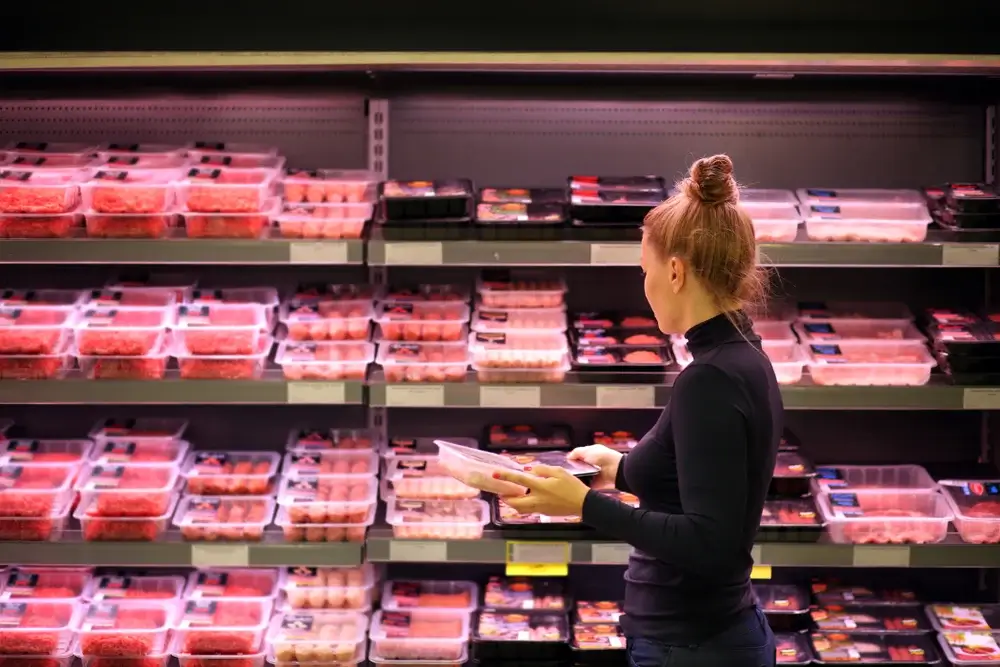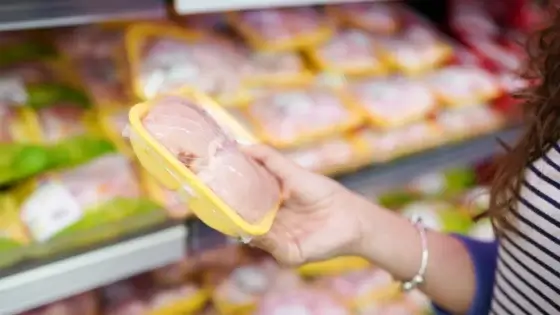How Much Do You Really Need to Worry About Bird Flu?
Answer: not that much, but more than you might think.
How Much Do You Really Need to Worry About Bird Flu?
Answer: not that much, but more than you might think.

via Shutterstock/LADO
This current strain of Highly Pathogenic Avian Influenza (HPAI, more commonly known as bird flu) is causing problems. It’s been detected in nearly 97 million birds in commercial or backyard flocks, with another 9,500 wild birds confirmed infected. In birds, it can cause coughing and breathing trouble, swelling and, ultimately, death.
And despite the name, bird flu doesn’t only impact birds. Since 2022, there have been four cases reported in humans and, more recently, more than 100 herds of dairy cattle in the US alone. The infection has also been found in both the milk and meat of these animals. This month, the Canadian Food Inspection Agency updated its testing eligibility for cattle and said it would now cover some of the testing fees, to ensure any outbreaks are dealt with swiftly. Luckily, in humans, the disease isn’t known to be fatal, but it can lead to high temperatures, breathing trouble, diarrhea, conjunctivitis and potentially more serious complications such as pneumonia or respiratory illness.
So, what does this mean for your grocery order? Let’s break it down.
First, poultry. Is it safe to eat?
Yes. Experts say it is highly unlikely that humans can contract the virus from properly cooked meat or eggs. This means cooking eggs until the yolk and whites are firm and chicken to at least 165°F. And to be safe, keep raw poultry away from any other foods.
But what’s even more important is that infected meat or eggs are very unlikely to reach grocery store shelves in the first place. According to a USDA predictive model, there is a less than five percent chance that infected eggs or meat might make it to the grocery store—and the model also predicts that if that did happen, 98 percent of infected eggs could be recalled immediately.

But what about milk?
Recent studies of about 300 commercially available dairy products revealed inactive HPAI in one in five samples. That number seems like a lot on the surface, but there’s one key element: pasteurization. There is increasing evidence that the pasteurization process neutralizes the virus, making pasteurized dairy products safe to consume.
In the 297 samples tested by the USDA, there was no instance of a live, viable virus in any pasteurized product.
Is beef ok?
As with poultry and eggs, it’s highly unlikely that infected beef would make it to store shelves in the first place. However, if it does, experts also agree that properly cooked beef carries very little risk of transmitting the virus to humans. Cooking your meat to an internal temperature of at least 165 degrees Fahrenheit (74 degrees Celsius) will neutralize avian flu, E Coli and any other bacteria.

So, what do I need to know?
The main thing to ensure when shopping for or preparing food is that you’re following safe food guidelines. Consuming raw eggs (looking at you, cookie dough) or unpasteurized dairy products could increase your risk of not just HPAI but salmonella, E Coli, listeria or other food-borne illnesses. Raw ground beef can also be a transmitter of those illnesses, so store beef at 40 degrees F or below, and use it within a few days. It’s also best to cook ground beef to an internal temperature of at least 160 degrees F.
If you are someone who regularly comes in contact with farms, be they poultry or cattle, following a strict biosecurity plan will help reduce the risk of transmitting infections. That means tightening visitor access to your farm, wearing clean boots and clothes and removing or controlling any standing water. In the meantime, officials are looking at several solutions to mitigate these outbreaks, including new vaccines.
Follow us
This work is licensed under a Creative Commons Attribution-NoDerivatives 4.0 International License.
Want to republish a Modern Farmer story?
We are happy for Modern Farmer stories to be shared, and encourage you to republish our articles for your audience. When doing so, we ask that you follow these guidelines:
Please credit us and our writers
For the author byline, please use “Author Name, Modern Farmer.” At the top of our stories, if on the web, please include this text and link: “This story was originally published by Modern Farmer.”
Please make sure to include a link back to either our home page or the article URL.
At the bottom of the story, please include the following text:
“Modern Farmer is a nonprofit initiative dedicated to raising awareness and catalyzing action at the intersection of food, agriculture, and society. Read more at <link>Modern Farmer</link>.”
Use our widget
We’d like to be able to track our stories, so we ask that if you republish our content, you do so using our widget (located on the left hand side of the article). The HTML code has a built-in tracker that tells us the data and domain where the story was published, as well as view counts.
Check the image requirements
It’s your responsibility to confirm you're licensed to republish images in our articles. Some images, such as those from commercial providers, don't allow their images to be republished without permission or payment. Copyright terms are generally listed in the image caption and attribution. You are welcome to omit our images or substitute with your own. Charts and interactive graphics follow the same rules.
Don’t change too much. Or, ask us first.
Articles must be republished in their entirety. It’s okay to change references to time (“today” to “yesterday”) or location (“Iowa City, IA” to “here”). But please keep everything else the same.
If you feel strongly that a more material edit needs to be made, get in touch with us at [email protected]. We’re happy to discuss it with the original author, but we must have prior approval for changes before publication.
Special cases
Extracts. You may run the first few lines or paragraphs of the article and then say: “Read the full article at Modern Farmer” with a link back to the original article.
Quotes. You may quote authors provided you include a link back to the article URL.
Translations. These require writer approval. To inquire about translation of a Modern Farmer article, contact us at [email protected]
Signed consent / copyright release forms. These are not required, provided you are following these guidelines.
Print. Articles can be republished in print under these same rules, with the exception that you do not need to include the links.
Tag us
When sharing the story on social media, please tag us using the following: - Twitter (@ModFarm) - Facebook (@ModernFarmerMedia) - Instagram (@modfarm)
Use our content respectfully
Modern Farmer is a nonprofit and as such we share our content for free and in good faith in order to reach new audiences. Respectfully,
No selling ads against our stories. It’s okay to put our stories on pages with ads.
Don’t republish our material wholesale, or automatically; you need to select stories to be republished individually.
You have no rights to sell, license, syndicate, or otherwise represent yourself as the authorized owner of our material to any third parties. This means that you cannot actively publish or submit our work for syndication to third party platforms or apps like Apple News or Google News. We understand that publishers cannot fully control when certain third parties automatically summarize or crawl content from publishers’ own sites.
Keep in touch
We want to hear from you if you love Modern Farmer content, have a collaboration idea, or anything else to share. As a nonprofit outlet, we work in service of our community and are always open to comments, feedback, and ideas. Contact us at [email protected].by Emily Baron Cadloff, Modern Farmer
July 5, 2024
Modern Farmer Weekly
Solutions Hub
Innovations, ideas and inspiration. Actionable solutions for a resilient food system.
ExploreShare With Us
We want to hear from Modern Farmer readers who have thoughtful commentary, actionable solutions, or helpful ideas to share.
SubmitNecessary cookies are absolutely essential for the website to function properly. This category only includes cookies that ensures basic functionalities and security features of the website. These cookies do not store any personal information.
Any cookies that may not be particularly necessary for the website to function and are used specifically to collect user personal data via analytics, ads, other embedded contents are termed as non-necessary cookies.